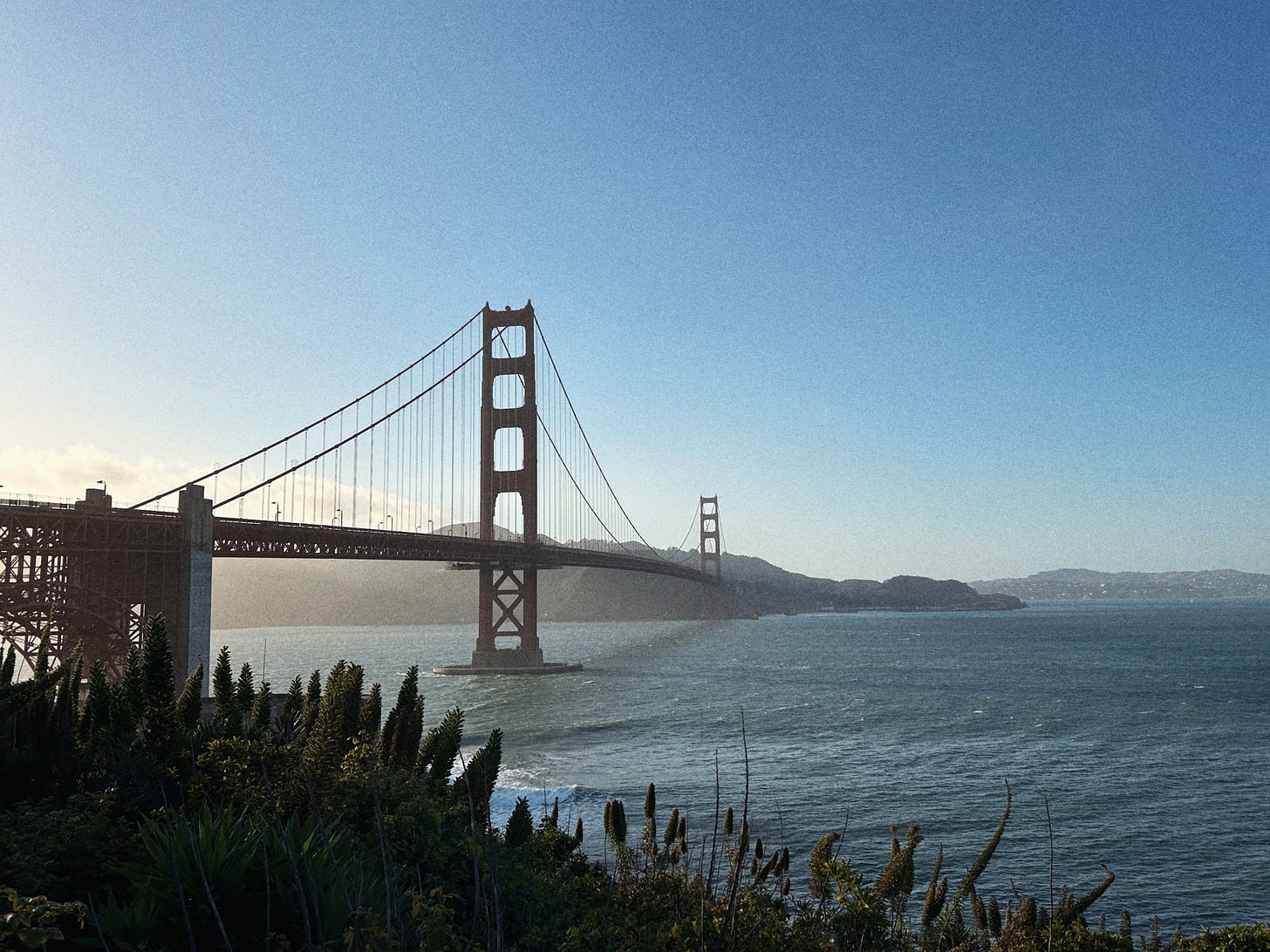
San Francisco has become ground zero for AI progress, attracting tech talent from every corner of the globe. They arrive with polished pitches, packed calendars, and hearts full of ambition. Some hunt for jobs, others chase funding or attend incubators, and many simply come to "lock in" and plug into the AI scene.
You might assume I was one of them—another tech pilgrim making the trek to the promised land with such an agenda. But that's wasn't quite the case.
My relationship with San Francisco started two years ago during a brief ten-day work trip. Between meetings, I caught glimpses of a city that lodged itself in my mind. I knew I had to return, properly this time. For two years, I plotted and planned, my resolve reinforced by an X feed where every other day someone I respected proclaimed "SF is so back." The FOMO was real.
So when I finally positioned myself with enough time and money, I decided to scratch this nagging itch properly. In June and July of this year, I spent seven weeks living in San Francisco—not to raise money, job hunt, or network my way into the next big thing. I went to simply live.
In this post, I share various aspects of my experience living in SF. Before getting into it, note that:
-
I tried spending most of my days as I would back home. This means my observations skew more toward everyday quality of life than the tech-first perspective you might otherwise expect from a post like this.
-
This was the first time I'd spent this much time in a single city outside of India (Nepal doesn't really count). At various points in this post, I will inevitably compare SF with the Indian cities (Mumbai and Bengaluru) I've lived in.
-
I spent just two months. I'm sure many of these views would change, or their novelty would wear off, had I spent longer. Please bear with my rose-tinted perspective.
Streets & Sunshine
What I miss most about SF is how walkable it is. As someone who loves walking and does their best thinking on foot, I cherished my 20-minute walks to and from my workspace (a friend's startup), plus a daily hour-long evening stroll along the Embarcadero waterfront.
So many factors contribute to this. Wide sidewalks (often wider than the roads), right of way to pedestrians, and the lax jaywalking laws (hard to get the India out of you!). I could walk the city for hours, and on some days I did.
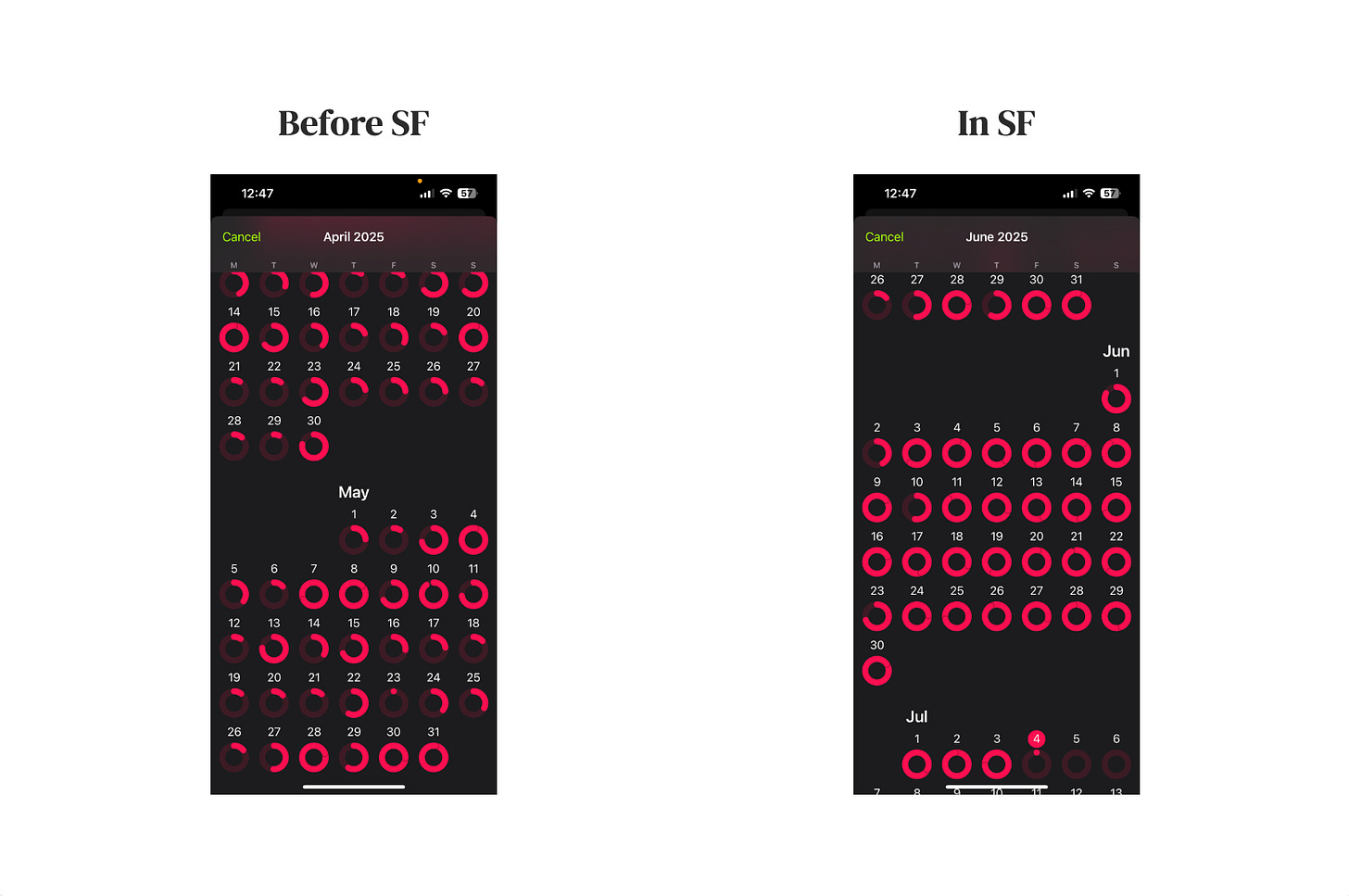
SF is infamous for its homelessness and drugs problem. I walked through these neighborhoods too (including a memorable late Friday night walk through the Tenderloin). Yes, some sights are shocking, and you wonder how things got so bad. But not once did I feel unsafe or threatened. These areas are relatively isolated and easily avoided, leaving plenty of the city to explore.
Then there's the weather. Yes, California is known for having some of the best weather in the world. But only after experiencing it daily for weeks could I appreciate how much constant outdoor comfort elevates your mood. And it's perfect for walking!
Open Spaces & Nature
One of my biggest frustrations with Indian cities has been the lack of public spaces to simply exist in. When you want to go out, your options typically narrow down to restaurants and bars. Mumbai has its waterfronts, but they're almost always crowded and stinky. Bangalore has Cubbon Park, but the moral policing makes you second-guess every move and kills any sense of relaxation. As Indians, we're starved of experiences and common hangout spots in our cities.
SF felt like coming up for air.
I spent lazy afternoons sunbathing at Mission Dolores Park, meditated in the stillness of the Japanese Tea Garden, tossed a frisbee in an empty Ocean Beach, sipped coffee in Yerba Buena Gardens on a cold day, battled fierce winds to catch a perfect sunset at Mt. Tam, and ate tacos while watching sailboats drift in Sausalito. And I'm sure I barely scratched the surface of things to do.
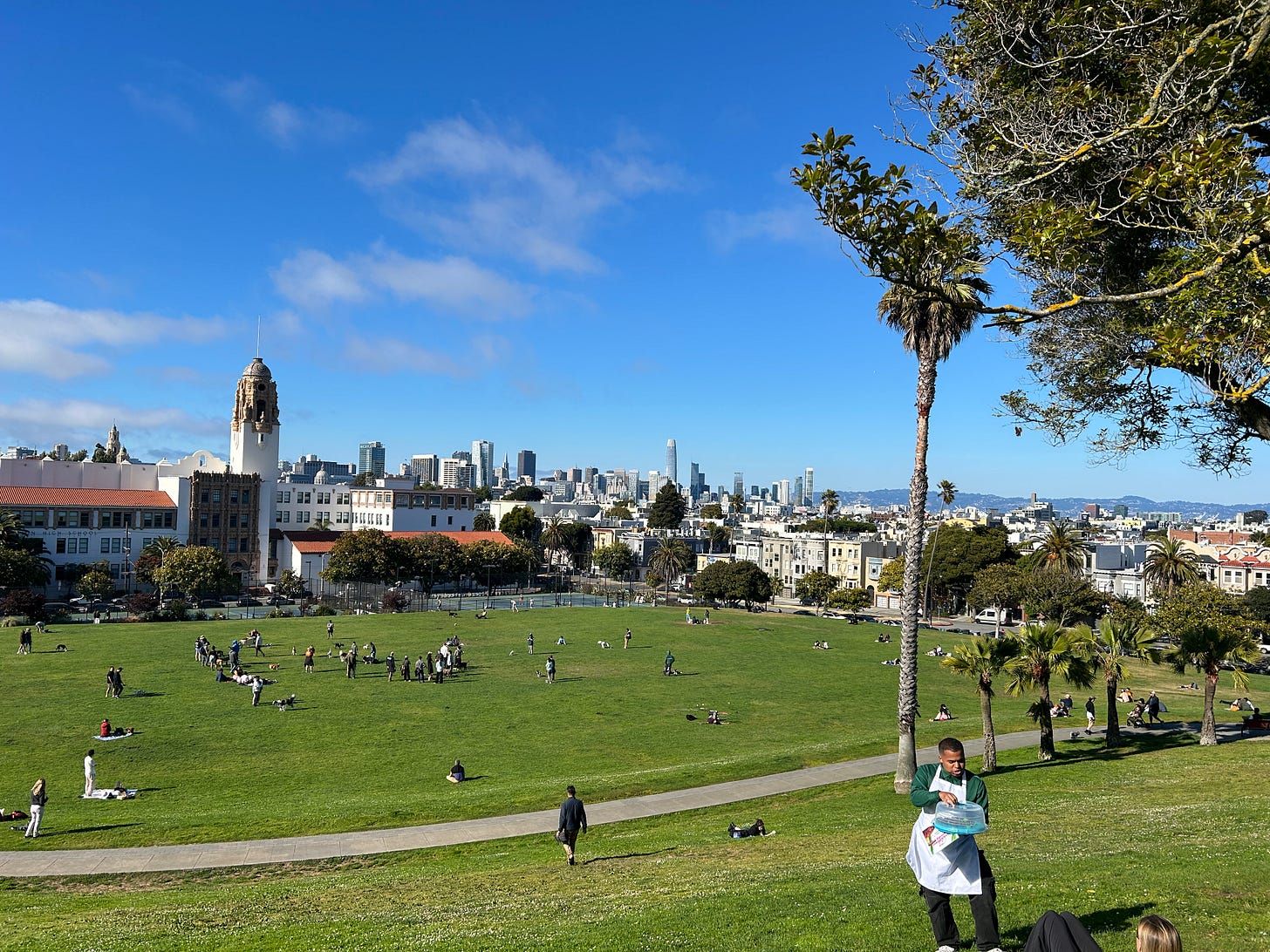
Lazy afternoon at Mission Dolores Park
The city also sits near countless natural wonders.
I took a trip to Yosemite National Park, where I spent a week climbing mountains, gazing at waterfalls, swimming in crystal-clear lakes, walking among giant sequoias, driving roads that twisted through California's most dramatic landscapes, and watching black bears munch on berries. I found both solitude among stunning vistas and unexpected conversations with travelers from around the world.
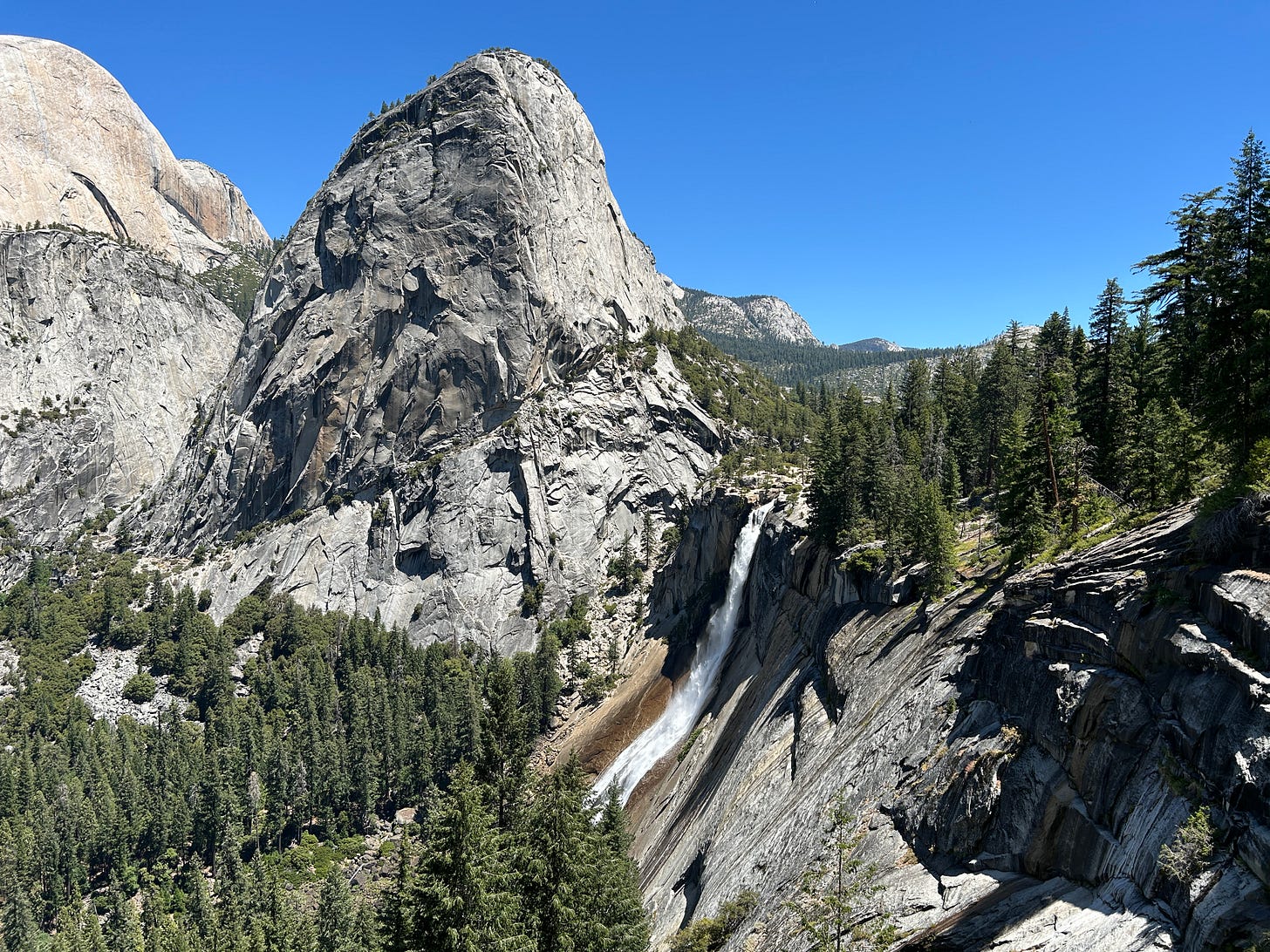
Vernal Falls at Yosemite National Park
I also took a weekend road trip to Big Sur with friends. Monterey charmed us with its small-town quietness—and it was quite an experience spending an evening at the beach wrapped in blankets rather than swimsuits! Along the Big Sur route, we stopped every few miles for one postcard-worthy scene after another. Turns out, you can't get enough of the Pacific crashing against California's dramatic coastline.
As someone who seeks out nature and green spaces whenever possible, SF felt designed specifically for me.
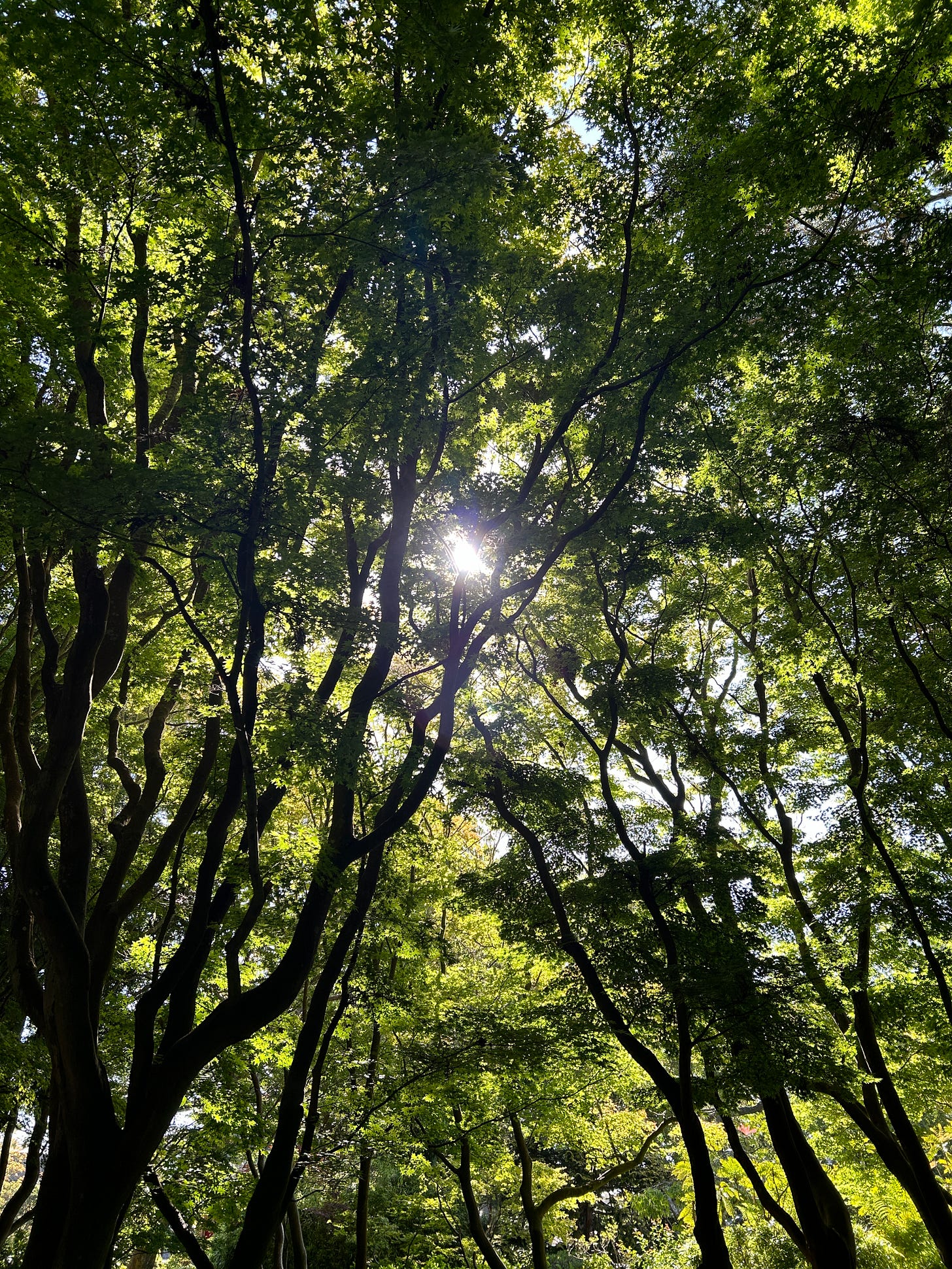
Japanese Tea Gardens
Food Scene
This might be embarrassing to admit, but I've never cooked for myself. (One of the privileges of being an only child in an Indian family, I guess.) That changed in SF.
Thanks to ChatGPT (parts of my life are already unimaginable without it) and having Trader Joe's, Target, and Whole Foods all within walking distances, I spent Sundays grocery shopping and meal prepping (what took two hours my first week took just 30 minutes by week five).
The food landscape in SF surprised me in several ways:
The overwhelming abundance. Choosing between eight types of apples, twelve types of eggs (how different can AA Brown and AAA Brown eggs really be?), or six cuts of steak felt absurd. Picking a wine bottle from a hundred options might take longer than drinking it. The novelty faded after a few weeks, but it remains astonishing.
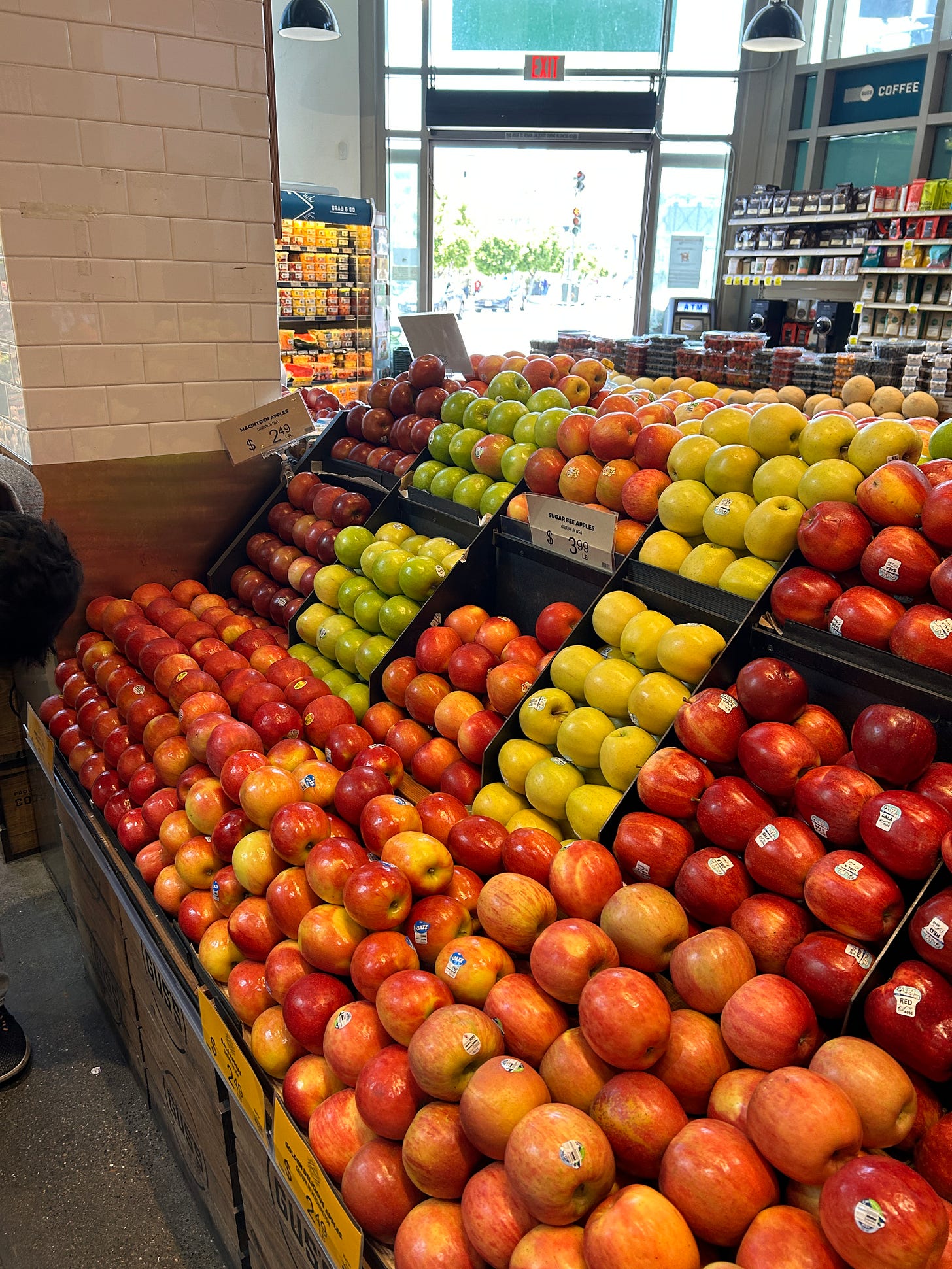
I wasn't kidding about the apples
Everything simply tastes better. Fruit, vegetables, and meat are much fresher than back home.
Stores like Trader Joe's fascinated me. Everything is their own brand—trust in the store translates to trust in any product they sell. This eliminates the decision fatigue of choosing between competing brands that plagues typical supermarkets.
Access creates responsibility. Having whatever food you want means it's incredibly easy to eat both very clean and very unhealthy. My first four weeks, I followed a practically perfect diet (hitting my protein goals consistently for the first time ever) and never felt better. Sadly, my last week consisted of nothing but delicious junk. Willpower—not lack of options—decides your diet.
I ate out about 15 times during my stay, and remarkably, every meal cleared the 7/10 bar. Perhaps mediocre restaurants simply can't survive SF's brutal combination of high rents and fierce competition. The city's restaurant density is staggering—you're never more than a block from something worth trying.
My favorites became regular haunts: Mr East Kitchen, right below my apartment, for homely comfort food whenever cooking felt like too much. Burma Love, with its moody ambience and Burmese-fusion dishes I'd never find back home. Taniku Izakaya, whose ramen was so good I kept ordering the same bowl.
The System works
While staying in Yosemite, I did something incredibly stupid. I drove my rented Nissan Sentra down a stretch of road that had no business hosting anything other than a 4x4, and found myself with half my car sank into deep mud. It was late evening, I was in the middle of a forest deep in the wilderness, and I had zero cell reception.
Somehow, I managed to connect with 911, who patched in the forest service. I could hear them clearly but they could barely make out my words. They caught fragments: stuck car, somewhere near Jackass Meadows. But Jackass Meadows was massive. Then, 911 pulled my exact coordinates, accurate to four decimal places, and relayed them to the forest service. "We're sending someone," they said.
Three anxious hours later, headlights appeared in the distance. A jeep pulled up carrying two female officers and a service dog. They'd driven three hours to reach me. I braced for the scolding I deserved—stupid tourist doing stupid tourist things. Instead, they greeted me with the warmth and humor you'd expect from a friend, not cops rescuing an idiot. They hooked my car to their jeep, pulled me free, and sent me off with nothing more than a gentle reminder to drive carefully.
As I drove back, I couldn't help but think about what this scene would have looked like back home. Would I have even reached emergency services? Would anyone have driven three hours into the wilderness for one stranded fool? Would the encounter have ended without bribes, abuse, or at minimum a telling-off? The story would have had a dozen different endings, none of them this clean.
Sure, I got lucky with the officers who showed up. But what struck me was that the entire system worked exactly as designed. Someone in trouble called for help, and help arrived. Without drama, complications, or negotiations. A system built to serve its citizens did precisely that.
What's in a name?
Toward the end of The Founder, a devastated Dick McDonald confronts Ray Kroc about why he didn't simply copy their system instead of partnering with the brothers to expand the franchise.
Ray Kroc: "It's not just the system, Dick. It's the name. That glorious name, McDonald's. It could be anything you want it to be… it's limitless, it's wide open… it sounds, uh… it sounds like… it sounds like America."
That first McDonald's, the one that captured Kroc's imagination, was in San Bernardino, California. Maybe that's no accident. As the weeks passed, I found myself paying special attention to the names of places I encountered in California.
They had a kind of music to them: Folsom, Embarcadero, Nob Hill, the Mission, Tenderloin, SoMa, Japantown, Sunset. Step outside the city and you get Sausalito, Monterey, Fresno, Wawona, Yosemite, Tuolumne.
Each carried weight and character, as if they had a story waiting to be told.
Perhaps I'm especially attuned to this magic, having grown up watching movies made in California, following companies and using products named after its places, seeing it stand in for the future itself. But I think it's more than nostalgia. I think the builders of this land understood that places deserve names as grand as the dreams they have for them.
And they chose them carefully.
Breaking Free
Towards the end of my stay, I started feeling something I'd never quite experienced before: genuine freedom. The freedom to dress how I wanted, speak my mind, eat anything, go where I pleased—without the constant mental calculations that had become second nature growing up in Indian society.
This hit me during a Big Sur trip with a college friend who'd moved to the US four years earlier. I kept asking him "can I do this?" or "is this okay?" about the smallest things. His response, almost always, was "jo karne ka hai kar bhai" (do whatever the fuck you want to, bro).
Being allowed to just exist without seeking approval was intoxicating.
That is freedom. And it felt lovely.
Until Next Time
As you've probably gathered, I had a wonderful time in SF. But I'm aware my experience was limited. Two months isn't enough to see the full picture. I didn't navigate the healthcare system, didn't encounter any real danger, didn't stay long enough for homesickness to set in. I got lucky, and I can only share what I experienced.
Some of you—especially if you've grown up in the US—might read this and think I've glossed over a hundred problems. Maybe you'll compare today's SF to some golden era. If so, I'd only ask for perspective. You have it good. Many basics you take for granted—clean air, safe food, functioning systems—are things we can't access in India at any price.
I became friends with a builder from Nigeria during my stay. Something he told me stuck: "Any time I feel low or think my life isn't going the way I want, I pause and remind myself that I'm a kid from Nigeria living in the fucking US."
I get where he's coming from.
Thank you for hosting me, San Francisco. You were wonderful.
I'll see you soon.
A note on costs: My room in a 2B2B cost ~$1,800/month (prorated for my stay) at 900 Folsom, a 15-minute walk from Salesforce Tower. I spent roughly $200/week on groceries and eating out. Yosemite ran me ~$1,000, Big Sur ~$300. Yes, it ate into my savings. Worth every penny.
On the tech scene: Yes, SF makes it easy to be "locked in"—I got more done in seven weeks than I sometimes do in months back home. And yes, it's home to some of the smartest, most driven people in the world who can genuinely inspire you. But there's a flip side: it's incredibly easy to get absorbed into the monoculture, to start thinking and living exactly like everyone else. The city's intellectual density can also lead to intellectual conformity. Staying yourself takes deliberate effort.